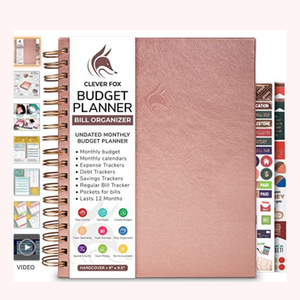11 Best Financial Self-Care Tips
 Financial Self-Care Tips empower us to prioritize their financial health, from creating a budget that works to building an emergency fund with confidence.
Financial Self-Care Tips empower us to prioritize their financial health, from creating a budget that works to building an emergency fund with confidence.
When we think of self-care, images of spa days and yoga classes often come to mind. But true self-care goes far beyond bubble baths—it’s about creating a life of balance, security, and joy.
A crucial yet often overlooked part of self-care is financial self-care. For women, financial self-care isn’t just about managing money; it’s about empowerment, independence, and peace of mind.
Financial self-care allows you to take control of your finances, prioritize your goals, and reduce the stress that comes from money worries. It’s about making thoughtful decisions that align with your values and set you up for long-term success. In this guide, we’ll explore how to nurture both your wallet and your well-being, giving you the tools to thrive.
.
Table of Contents
Financial Freedom Tools
Below are some to the financial freedom tools that will help in developing your financial freedom either by properly creating a budget that works for your personal style. It also includes the different strategies that will ensure your retirements goals are achievable.
 Financial Budget Planner
Financial Budget Planner
It has many financial tips, trackers and and strategies to implement along the way.
- Home Finance and Bill Payment Organizer
- Budgeting Book with Income and Expense Tracker
- Daily, weekly, monthly and yearly budgets
- Has spacious pocket for all your bills, set annual financial goals, build a viable strategy,
.
 Budget Planner
Budget Planner
This is a comprehensive budget planner that is aimed in saving money and repaying debt fast
- Monthly bill organizer with pockets
- Expense tracker and finance journaling
- Financial calendar tracks money & savings,
- Debt tracking, Payment, Balances
- Bill tracking, and 2 pages for annual
.
 Personal Finance Book
Personal Finance Book
This book showcases how to completely transform your finances by showing step by step strategies
- Simplified beginners guide to eliminate financial stress
- Comes with digital simplified templates to use
- Saving strategies that can quickly save money
- Debt paying strategies that will erase debt faster
- Easy Strategies to implement and track your progress
1. Create a Budget That Aligns with Your Goals
Budgeting is the cornerstone of financial self-care. But it’s not just about restricting spending—it’s about aligning your money with your priorities. Start by listing your income and expenses to see where your money is going. Then, allocate funds to what matters most, whether that’s savings, debt repayment, or a fun night out. A budget isn’t a punishment; it’s a roadmap to achieving your dreams while living comfortably in the present.
2. Build an Emergency Fund for Peace of Mind
Life is unpredictable, and having an emergency fund can be a lifesaver. Aim to save three to six months’ worth of expenses in a separate, easily accessible account. This financial cushion will reduce stress during unexpected events like medical bills or car repairs. Start small if you need to—saving even $10 a week adds up over time. Knowing you have a safety net can bring a profound sense of security.
3. Pay Yourself First
Financial self-care tips includes taking care of yourself financially. One of the best financial habits you can develop is paying yourself first. This means setting aside money for savings and investments as soon as you receive your paycheck, before paying bills or spending on other things. Treat your savings like a non-negotiable expense. Automating your savings can make this process effortless and ensure you’re consistently building wealth over time.
4. Invest in Financial Education
Knowledge is power, especially when it comes to money. Take the time to educate yourself about personal finance topics like investing, retirement planning, and credit management. There are countless resources available, from books and podcasts to online courses. The more you understand about money, the more confident you’ll feel in making decisions that support your goals. Financial literacy is a form of self-care that pays dividends for a lifetime.
5. Set Boundaries Around Money Conversations
Financial self-care includes protecting your mental and emotional well-being. This means setting boundaries around money conversations, especially with friends and family. If someone pressures you to overspend or loans you’re uncomfortable repaying, it’s okay to say no. Be clear and assertive about your financial limits. Maintaining healthy boundaries ensures your financial decisions align with your values and priorities, not someone else’s expectations.
6. Make Saving Fun with Challenges and Rewards
Saving money doesn’t have to feel like a chore. Turn it into a game by participating in savings challenges, like the 52-week savings challenge or a no-spend month. Celebrate milestones, like reaching a savings goal, with small rewards that make you feel accomplished. Making saving fun can transform your mindset and keep you motivated to stick to your financial goals.
7. Regularly Review Your Financial Health
Just like scheduling routine health check-ups, it’s important to assess your financial health regularly. Set aside time each month to review your budget, check your credit score, and evaluate your progress toward your goals. Use this time to identify areas where you can improve and celebrate your achievements. Regular reviews keep you informed, proactive, and in control of your financial well-being.
8. Tackle Debt Strategically
Debt can be one of the biggest stressors in life, but with a strategic plan, you can take control of it. Start by listing all your debts, including interest rates and minimum payments. Focus on paying off high-interest debts first (the avalanche method) or tackle the smallest balances to gain momentum (the snowball method). Whichever strategy you choose, commit to consistent payments and celebrate your progress along the way.
9. Automate Your Finances for Stress-Free Management
Automation is a game-changer when it comes to financial self-care. Set up automatic transfers to your savings, investments, and bill payments. This reduces the risk of missed payments and ensures you’re consistently working toward your goals. Automation also frees up mental space, allowing you to focus on other areas of your life without constantly worrying about money management.
10. Prioritize Self-Care Spending
Self-care isn’t selfish—it’s essential. Allocate a portion of your budget to things that make you happy and enhance your well-being, whether it’s a fitness class, a hobby, or a weekend getaway. The key is to plan for these expenses so they don’t derail your financial goals. By prioritizing self-care spending, you’re investing in your mental and emotional health while maintaining financial balance.
11. Protect Yourself with Insurance
Insurance is a critical aspect of financial self-care that’s often overlooked. Whether it’s health, life, or renters insurance, having the right coverage protects you from financial fallout during unexpected events. Research your options and choose plans that fit your needs and budget. While it may feel like an extra expense, insurance provides peace of mind and long-term security.
12. Align Your Finances with Your Values
Financial self-care is about more than just numbers—it’s about living a life that reflects your values. Take time to identify what matters most to you, whether it’s family, travel, or giving back to the community. Then, align your spending and saving habits with these priorities. When your finances reflect your values, you’ll feel more fulfilled and in control of your life.
Conclusion
Financial self-care is a powerful way to prioritize both your wallet and your well-being. By taking proactive steps to manage your money, set boundaries, and align your finances with your goals, you’ll reduce stress and create a life of security and freedom.
Remember, financial self-care isn’t about perfection—it’s about progress. Small, consistent actions can lead to big transformations over time. As you nurture your financial health, you’ll also nurture your confidence, independence, and peace of mind.
- 100 Valentine Lovers Questions - February 24, 2025
- 2025 New Year Growth Quotes - February 24, 2025
- 2025 Inspiring Self Love Quotes - February 24, 2025







